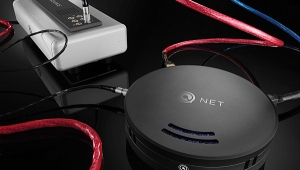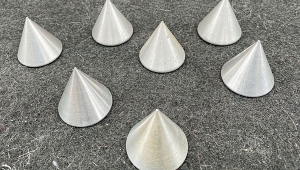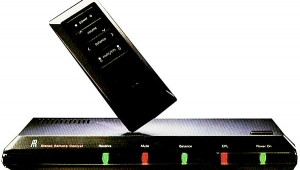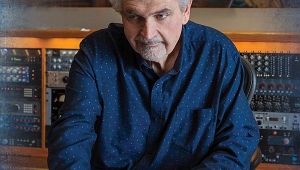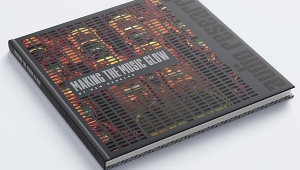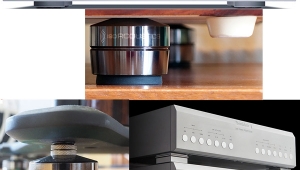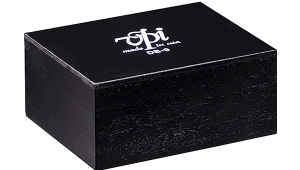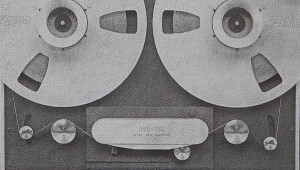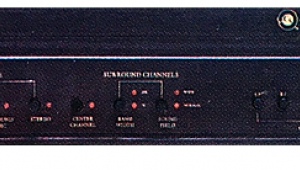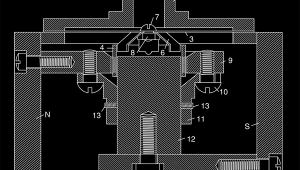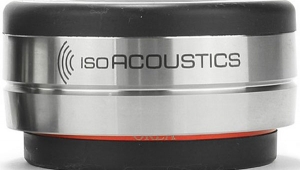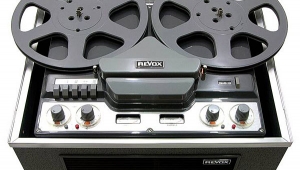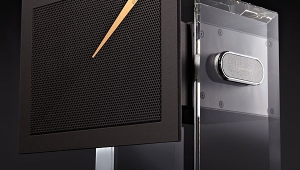| Columns Retired Columns & Blogs |
Tice R-4 TPT & Coherence ElectroTec EP-C "Clocks" Letters about the Tice Clock
Letters about the Tice Clock appeared in March & August 1991 (Vol.14 Nos.3 & 8):
Tice attacked
Editor: There follows a letter I wrote to George Tice:
Dear Mr. Tice:
After trying the model R-4 TPT clock in my system, I have returned the unit for refund. I have done this because the increase in performance did not match the dollar investment made in the clock. More improvement has been gained in my system by making simple tweaks that cost nothing, or were low in cost.
But the thing that upset me the most was instruction #4 on your instruction sheet. It reads:
"4) If you are encountering difficulties focusing in on changes made by TPT it is advisable that you try using two Clocks. Two Clocks will give twice the effect. Two Clocks will further outline the differences, making them easier to discern later when you listen with one Clock."
If two clocks give twice the effect, why did you not design the clock that way to start with, or offer another model that would give this increased performance at a reasonable price? Maybe this way two clocks can be sold; maybe ten clocks sound better than two.
This subject of price gets down to the real point I would like to make. The high end seems to be moving toward high-price ripoff!! What does this clock cost to produce? What technology does it offer? The underground mags say there is no extra circuitry involved, that the clock has been "treated," yet the Audio Advisor ad (where the clock was purchased) states there is a microchip installed. What is true? Maybe witchcraft is involved!
I would like to hear from you about this matter. I am sending copies of this letter to The Absolute Sound and Stereophile. —Jack Roberts, N. Myrtle Beach, SC
Tice defended
Editor: Should you publish Mr. Roberts's letter, we respectfully request that you also publish this response:
Dear Mr. Roberts:
We received your letter today and, to say the least, found it quite insulting. I will, however, out of courtesy to you, respond to it.
From the opening of your letter it is obvious that the TPT Clock did improve your system. You feel, however, that the dollar investment did not match the performance you hoped to get. You should be aware that there are no scales by which an improvement-per-dollar assessment can be made. It is largely dependent upon your own personal taste, hearing ability, and the quality of your system.
There are four reasons why someone could not get the full potential from a TPT Clock. They are: 1) You did not follow the directions. 2) There are one or more choke points in your system (a choke point is a component which is significantly below the quality of the rest of the system). 3) Your audio system is not up to the standards by which anything can be accurately judged. (I noticed in your letter you never mentioned what components you use.) 4) Your hearing ability is not as refined as that of other music lovers and audiophiles.
As to your point regarding other simple tweaks giving you more of an improvement: No other tweak you can do will eliminate electron noise on the power line.
Relating to your major concern regarding instruction #4, suggesting the use of two Clocks when you have a difficult time hearing one, some explanation is in order. Nowhere in any of our literature will you find Tice Audio suggesting that it is necessary to buy two Clocks. We suggested auditioning two Clocks in an effort to help those whose systems and hearing capabilities are not as refined as they should be to be able to focus on the improvements gained through the use of one Clock. Regarding your assertion that we are holding back the full treatment strength, you are again wrong.
We have already had many customers indicate their feeling that our TPT Clock was too powerful. This is evidenced by the fact that we have indicated in the updated Clock instruction sheet a method of reducing the power of the TPT Clock and thereby reducing its effect on your system.
Your accusation that we purposely held back processing of the Clocks to force consumers to buy two, three, or ten, as you suggest, is quite frankly an insult of the lowest order. It is not technically possible to make one Clock as strong as two. We take pride in offering high-quality products at a fair market price. Before we would lower ourselves to "ripoff" schemes, we would just as soon resign from audio and close our shop.
I think before you condemn a large part of the high-end manufacturing industry, you should tell me what your qualifications are to make this assessment. Having been involved in audio for 32 years, I can tell you quite frankly that I do not know more than two or three people in the entire business that are really making big money. I do know many people who have sacrificed their homes, life savings, and, unfortunately in too many cases, their marriages, in an effort to follow their dreams.
Please feel free to call me any time and I will be more than happy to outline the costs of producing quality products and running a business in America. Since you are making the assertion that our Clock and many other high-end products are "ripoffs," I would like you to tell me how much money we have invested into research and development of the TPT process and what was the cost of developing our processing machines, not to mention the thousands of hours of my own personal time spent working on this project?
Since you are using the word ripoff, according to Webster's Dictionary this is defined as "a means of cheating, stealing, robbing, or exploiting." Who put a gun to your head to force you to buy our products? I would suggest you use your words more carefully. As your own letter actually indicates, no one has ripped you off; your money was refunded.
I am a firm believer in the American capitalist system. I have a right to price my products as high or as low as I deem necessary. I have a right to recoup the money and time I have invested in a product or technology; I also have to face the consequences when we invest money in a project that does not fly. This is the American way. You, the consumer, have the right to respond by buying or not buying our products. If I price our products too high, then I will soon find my company out of business. On the other hand, if I price our products too low, the end result is still the same. You must realize that audio is an expensive hobby. You should not be angry with audio manufacturers because you cannot afford to buy their products. You should perhaps look inward to ask yourself, "Why can't I afford the things I want in life?"
Regarding your question "What technology does the Clock offer?": TPT is a material treatment system which, when integrated with other systems—ie, your electrical system—eliminates electron noise caused by the random and chaotic movement of electrons in a conductor. We will have a white paper explaining this process in further detail available by the time you receive this letter.
Regarding your comments on extra circuitry, no extra circuits have been added to the Clock. The Clock is only a carrier of the TPT technology. I realize this is a difficult concept for some people to grasp: the Clock has been treated with the TPT process. This is very much the same idea as cryogenically treating components. Those components are not visually modified or altered, but the treatment changes them on a molecular level. The same is true for our TPT process. As to the Audio Advisor mentioning that an additional chip was added to our TPT Clock, this is incorrect. The Audio Advisor does not send us proofs of their catalogs and advertisements before they go to print. They are in error regarding the chip. We did, of course, advise them as soon as we received our copy of their new catalog.
As far as your comment regarding "Witchcraft," it is like your letter: ridiculous!
What upsets me most regarding your letter is that you find it necessary to try to get your letter published without even giving me the courtesy of a phone call to discuss your thoughts. What did we do to you that was so terrible that you would find it necessary to write such a deleterious letter and try to get it published, thereby tarnishing the image of an honest and respectable company that has improved and advanced the audio industry?—George R. Tice, President, Tice Audio Products
Tice redux
Editor: After reading TJN's review of the Tice Clock and JA's "As We See It" (March 1991), it was impossible not to write to you...As far as Myles Astor's report [about a demonstration of the TPT effect staged by Mr. Tice, credited by Sam Tellig to Miles Asteroid] is concerned, I was present at the same demo as Mr. Astor. (There were about 30 others present.) The system used for the audition was quite expensive. One would think that subtle variations would be audible on this all–Class A setup. But, to be fair to Mr. Tice, it was not the best possible circumstance to hear very, very subtle variations. On the other hand, he did volunteer to make the demo, presumably with full knowledge of the circumstances and confident of positive results.
Mr. Tice began by holding up two AC cords. They were both identical, he explained. But one had been "treated." Both appeared to be standard AC cords rather than speaker cable, about 6' long, plugs on one end, the other unterminated. Mr. Tice went on to say that he would plug one cable into the AC outlets and there would be an improvement in the sound of the system. This was the treated one. On the other hand, he said, the untreated cable would have no effect!
The experiment was conducted, but the results were "unclear." Since the preamps and source were plugged in separately from the amps, Mr. Tice elected to try the experiment again, using the other outlets. I forget which he did first, amps or preamps. Again, the results were "unclear" in that no one heard much of any difference. Certainly the audience response indicated that there were no "earthshaking" or easily discernible differences. Privately, I queried at least a half dozen individuals, and none acknowledged hearing any difference [presumably other than Mr. Astor—Ed.]. Since they were all strangers to me, no one would seem to have a reason to color their private observations. I do not remember many (if any) publicly raising their hands to acknowledge hearing an effect. I know that I heard absolutely no discernible change...
If anything at all audible had occurred, I would be pleased to report it. Ten years ago, I was skeptical regarding the audibility of speaker cable. All it took to convince me was one listening test on a system of sufficiently high caliber, where the results were unmistakable.—Randy Bradley, Hannacroix, NY
And again
Editor: Should Mr. Tice be so angry with those who criticize his new clock (Vol.14 No.3, pp.29 & 217, and No.6, p.285)? Is it not possible to have conflicting opinions about such devices? Did anyone criticize his Power Block so severely? Perhaps it is Mr. Tice himself who should look inward to ask himself, "Why are there those who are criticizing me?"
While I've never lived in Ronkonkoma, NY (only Queens and Manhattan), in my neighborhood here in Ohio our powerline electronics seems to be well behaved, and seems not to benefit from Mr. Tice's Clocks. Like Old Man River, they jus' keep flowin' along.
When proffered explanations of these devices and potions clash with established knowledge of physics, while simultaneously failing the listening test, I can't help think that the capitalism Mr. Tice seems so enamored of is good old-fashioned capitalist hucksterism. Barnum was a master at it and did it in such a way that the people loved it, and went back again and again. But I don't remember him damning those who criticized him.
I suspect Stereophile readers want news about the latest crazes and gimmicks and about stereos from the cheapest to the most expensive dream system that they cannot afford until next Saturday's Lotto. What I think they don't need is depreciation of themselves, their hearing, or their systems via status-seeking, price-tag-conscious, and equipment-name dropping to intimidate those who honestly don't hear (or hear and don't like) these "magic" improvements in their stereos.
The race is not always to the swift or the battle to the strong, but that's the best way to place a bet.
And that's the way to buy a stereo: on the possible, provable, and hearable, not on the improbable or the fantastic!
But my disbelief in magic devices is more likely to increase sales to the true believers, and certainly anyone who wants these devices should be able to buy what they want. The right to make a fool of yourself is a cherished American right, and if it wasn't, Stereophile would never sell. But please give us magic-device agnostics the right to disbelieve in what we cannot hear or see!—Donald Bisbee, Columbus, OH
Tice, genius, uncertainty & indistinguishability
Editor: Congratulations to Stereophile for taking a reasonable stance on the Tice Clock issue. Doug Blackburn's "Clocked" article (June 1991, pp.124–5) refreshingly used satire to address the issue.
Might it be that many audiophiles suffer system insecurity and subscribe to an existential (ie, only what one experiences to be real is real) approach to system optimization? Constant bombardment with manufacturer claims and varying reviewer opinions has brought on system insecurity. An emphasis on the subjective and a lack of understanding of fundamental scientific principles has led to the present irrationality in high-end audio. Many of the professionals who can afford high-end gear needed only rudimentary education in the physical sciences (leastly, modern physics). Has this fostered a generation of wealthy customers who are easily beguiled by impressively constructed components accompanied by shrewdly composed copy? The recent Tice Clock phenomenon typifies this concern—especially the aspect of copy.
The hypotheses set forth by George Tice violate two fundamental principles of quantum physics: the Heisenberg Uncertainty Principle and the Principle of Indistinguishability. He proposes that his "TPT-treated" clock somehow correlates the flow of electrons in a determined manner. This claim suggests that he can change the wave function that describes the electron flow in order to obtain a specific result (ie, "orderly" electron flow). Unfortunately, all one can hope to obtain is a distribution of results due to the Heisenberg Uncertainty Principle.
Furthermore, the suggestion that electrons can be "programmed" implies distinguishability. The assertion that "normal" electron "flow" is random is essentially correct. Electron "flow" is random in the sense that it is described by a probability density function based on the wave function for the electronic system. The wave nature of the electron implies that the electron should be thought of as being distributed (delocalized) throughout the conductor. At any given time and for every location in the conduction band, there exists a probability that the electron resides at each location. (The probabilities are given by the above probability density function.)
Obviously, power-line conditioning is a practical concern, which has been addressed seriously by Tice's other products. His current explanation for the "effect" of his clock on a sound system leaves much to be desired. The significance of his latest contribution remains highly elusive, given the present state of our knowledge. To expand further on Tice's comment about genius, history has demonstrated that true genius is often not recognized until many years later. If the Tice Clock and TPT Technology reflect the man's genius, then it may not be recognized for a long time.—Karl A. Weber, Ph.D., Dublin, OH
Tice, physical reality, & closed minds
Editor: As a certified audiopsychotic, music buff, and student of silliness, I have been amused and bemused by the Tice Clock controversy since, knowing little about the physical laws said to govern our universe, I am mainly impressed by my own experience of reality. In this context, anything that promises to make my sound system sound better is sound. If someone told me that mumbling incantations into my speaker cones might yield positive results, I would try it. Then, if it worked, I would buy it without needing to know why it worked.
Obviously, however, JA has different biases.
I suggest that because JA has a technical background, anything that doesn't fit neatly into his model of reality must, by necessity, be "bullshit." George Tice's explanation of how and why TPT works smacks him in his conceptual face. Tice must, therefore, be a bullshit artist. Otherwise JA's philosophy becomes food for the crapper. Such thinking creates martyrs...
Go ahead, condemn George Tice, John. You don't need George Tice: Stereophile won't fold for lack of Tice Audio's advertising revenue. But the industry does need all of its innovators to be able to flourish without becoming martyred by closed minds. And that's not bullshit.—Leonard G. Birnbaum, Plainfield, NJ
Poof!
Editor: Couldn't we just wave our magic wand and make George and Francine Tice disappear once and for all?—Al Southwell, Las Vegas, NV
- Log in or register to post comments
